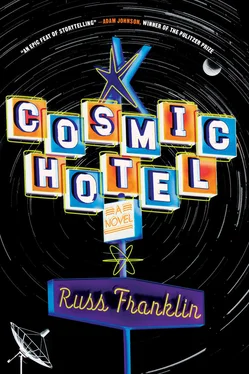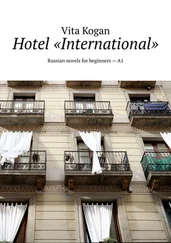On the way up to the room, I felt the forty-eight-hour recommended limit for my fish running down. I tried to call the only number I had for Van Raye in California to get some answer from him for what might be going on, but I got a recording: “The alumni house will begin taking reservations in March. .”
I called the physics department and explained to three different people I was trying to get in touch with Charles Van Raye and each person transferred me to someone else.
Holding the phone to my ear, I got out of the elevator and found 1201, our suite for at least the next six weeks, the orange doorbell glowing beside the door welcoming me. When I got inside, I leaned back against the door, and listened to a kind-sounding person named Mary, the “program coordinator” for the physics department, who said Van Raye was “indisposed for an indefinite period of time.”
I told Mary, “This is Sandeep Sanghavi. I’m Van Raye’s son.”
There was a pause and she finally said, “Would you like to leave a voicemail?”
His outgoing message wasn’t even his voice but a mailbox number. Why is he so fucking low-tech? I tried to gather myself so my voice wouldn’t shake, left a message telling him to call me. “This is Sandeep,” I added and then said, “Something strange is going on. Call me,” and on second thought, I said, “Does anyone call you just ‘Raye’?” and terminated the call, intuiting that he would never get this message.
For the first time, I allowed myself to look around the suite, and I would have given it two stars at most. It was large and smelled like an antique shop — slightly homey but “cancer causing” crossed my mind. There were high ceilings. One wall was missing a strip of chair railing. I unlocked the balcony door and pushed against wind pressure to step outside, the vast airport spread before me, wind smelling of diesel and jet fuel, and the patio was a dirty concrete, solid wall on each side for privacy, but twelve stories below me was the hotel’s rain-slick pool deck. Beyond the pool deck was a high perimeter security fence separating this property from Atlanta Hartsfield and the Airport Zone.
I went back inside and sat in a sofa chair and waited in the dimness for Elizabeth. One of my great skills was waiting. I’d done it all my life. A trance overtook me, and it was sunset by the time Elizabeth let herself in.
She flipped on a light and glanced at me without making eye contact, slipped her shoes off by the door.
“Where have you been?” she said.
“There have been some complications, I’m afraid.” I began with the facts. “Our shipment can’t be located. . ”
“Our shipment?”
She always hated when other people repeated what you said in order to give them a chance to think.
I told her that the website still listed them as “in flight,” though I was waiting on word from Gypsy about their exact whereabouts.
The inner tips of her eyebrows sought each other as I explained, and her movements slowed, her hand stopping at her earlobe when the earring snapped off.
“Sky Cargo could have them here at any moment,” I said.
She snapped the other earring off. Then she started to say something and let the gold earrings clatter to the table against her laptop like dice. She suddenly went to her new bedroom and shut the door with authority.
Her earrings lying on the table were supposed to be a gold-braided figure-eight knot, a knot I learned at the Ocean Navigator seminar I took at Bay Front Plaza Hotel in Tampa long ago.
She came out wearing a hotel robe, went into the kitchen, and found the chardonnay she’d ordered in the refrigerator. I hated the silent treatment.
She sat at the dining room table and opened her laptop, and I broke: “You don’t think this is my fault, do you?”
Her reading glasses reflected the computer screen.
“I want to know right now,” she said, “are you planning on contributing to this analysis, or are you going to make me do it all by myself? You should be taking over. I should actually be doing less.”
“Yes, I am, of course, I’m going to do my part, but I’m going to locate, you know, our stuff. That’s my first priority. The fish is in our stuff.” I put my hands behind my head.
I got up and checked our door to make sure it was secure, glanced out the peephole to the warped image of the Air of Liability beyond the railing, and then I checked that the door to the adjoining suite, which wasn’t ours, was locked.
“You have to will yourself to be in control,” she said. “When you do that, then good things — not bad things — will happen to you. Bad luck is beginning to follow you around.”
I pressed my head against the window and saw Gypsy Sky Cargo to our west, the facility bathed in so much light that it was practically daylight for the workers. Giant coils snaked along the ground and connected into aircraft. Tiny people in yellow rain slickers worked around the ankles of these giants. Nobody stood still. Gypsy Sky Cargo had always been Elizabeth’s ideal of efficiency.
“I’ll get our stuff,” I said.
I went and sat at the table beside her. I put my head in my hands.
“It’s a bad sign that all our boxes are missing,” she said. “Not one box showed up?”
She knew the answer.
I picked up her earrings.
She grabbed my hand to stop me from fiddling. “Listen to me, and listen to me good. The violin, the shipment. . Now stop and listen to me. I’m not saying this was directly your fault, but you have to stop this trend. You let bad things happen and pretty soon, we’re just one of those families that bad things happen to all the time. Trust me, I know families like this. I can’t stand them.” She seemed to consider what she had just said. “I don’t mean to be so harsh, but there is something despicable about how they let bad things happen to them, their inattention to details of life. The Epps, remember them?” I nodded. Susan Epps was Elizabeth’s college roommate and she had died of pancreatic cancer a few years ago. “They owned a farm in Virginia. Old money, from canning, of all things. The farm had an airfield for the family plane. The family drove the father in a jeep to the plane, then watched the plane crash on takeoff. A terrible tragedy. The family watched it happen — their father, husband, exploding into the trees with two children aboard. Was it his fault? Ronald was third-generation money, wasn’t much of a businessperson. Things were in decline because they were lazy and then he crashed.
“After that, her brother died in a bicycle accident in Spain. There were strange stories about how every time they traveled something tragic happened — family members lost for a month, someone caught a skin disease in Greece, another hit by a taxi in London. She, Susan, well you know that story. Her other brother works at a grocery store in North Carolina now. This is a phenomenon, it’s real. I will not be one of these families. It’s just you and me, we are a family who has to be vigilant, so you will have opportunities and have the big family.”
I picked the earrings back up and felt their weight.
“One of my regrets is that I could not have a large family,” she said.
“You never wanted a large family,” I said.
“Who doesn’t want a large family? But it wasn’t right for my generation. For economics, it needed to be only you and me.”
“I’m twenty-eight,” I said, “I’m not sure I am large-family material.”
“Find a younger woman. Find someone you are physically attracted to, a beautiful woman whom you can be attracted to for the rest of your life, and this woman should be a woman who wants to take care of you for the rest of your life and who will love you because you are successful.”
Читать дальше










![Benjamin Franklin - Memoirs of Benjamin Franklin; Written by Himself. [Vol. 2 of 2]](/books/747975/benjamin-franklin-memoirs-of-benjamin-franklin-wr-thumb.webp)
![Benjamin Franklin - Memoirs of Benjamin Franklin; Written by Himself. [Vol. 1 of 2]](/books/748053/benjamin-franklin-memoirs-of-benjamin-franklin-wr-thumb.webp)